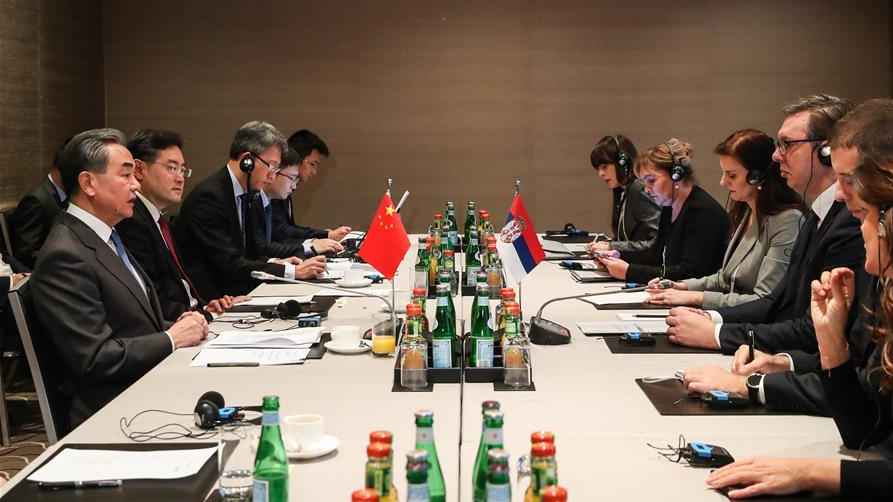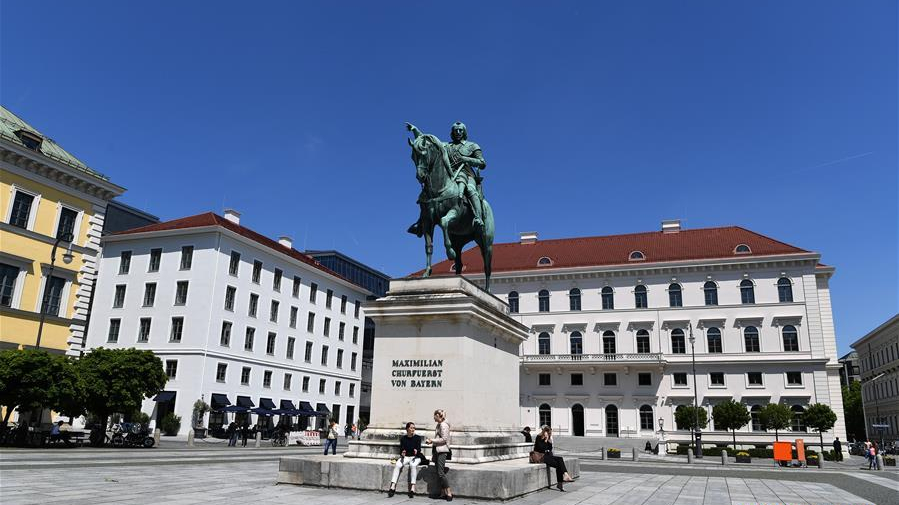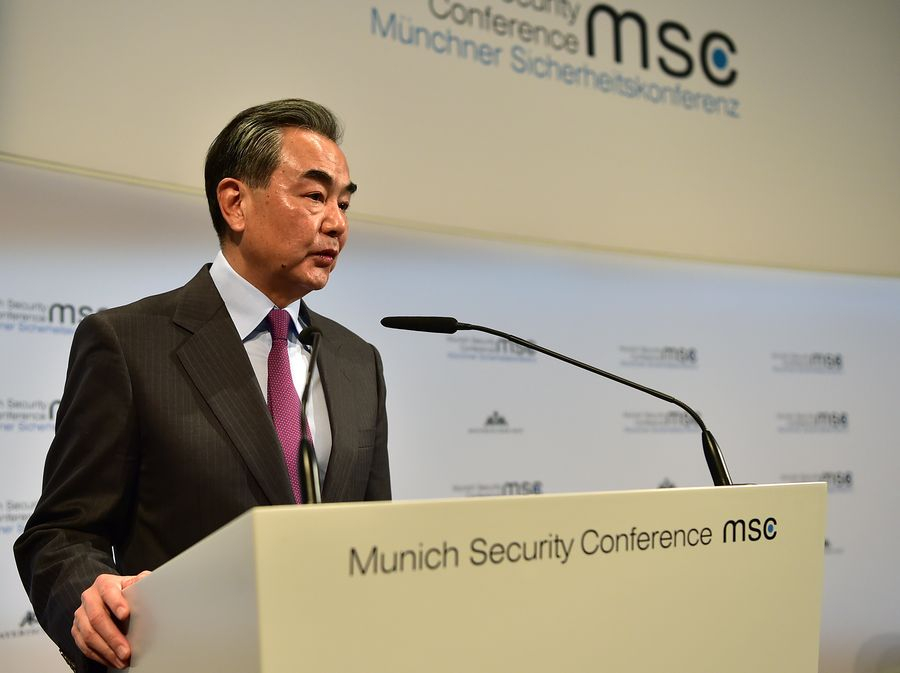
Chinese State Councilor and Foreign Minister Wang Yi (1st L) meets with Serbian President Aleksandar Vucic (3rd R) in Munich, Germany, February 15, 2020. /Xinhua Photo
Chinese State Councilor and Foreign Minister Wang Yi (1st L) meets with Serbian President Aleksandar Vucic (3rd R) in Munich, Germany, February 15, 2020. /Xinhua Photo
Editor's note: Hannan Hussain is a security analyst at the London School of Economics-South Asia Centre, and an author. The article reflects the author's opinions, not necessarily the views of CGTN.
Following years of accelerated state competition, escalating regional conflicts, and a common quest for peace, presidents, prime ministers, and senior ranking representatives from more than 40 countries gathered in Munich for the annual security conference. Approaching the theme of "Westlessness," officials brought many pertinent matters to light, but three key breakthroughs led the charge on collective action.
A European Security and Defense Union
Germany stressed the need for a European Security and Defense Union to encourage greater initiative on global peace, as relations with the U.S. continue to transition.
"Year by year, we are distancing ourselves from the goal of international cooperation to create a more peaceful world," said German President Frank-Walter Steinmeier. He added that "the United States, under the current administration, itself rejects the idea of an international community.”
This desire to promote Europe's brand of regional peace with a degree of independence from great powers, is both an implicit critique of NATO's own defense limitations, and an extension of French President Emmanuel Macron's earlier call. After the January escalations with Iran, Mr. Trump stressed a greater role for NATO in the Middle East – which many European allies viewed critically.
In recent times, "greater NATO" has become a reference point for Washington whenever its conflicts demand immediate damage-control. For instance, many of its closest allies – including the UK, Germany and France – were not consulted prior to U.S. actions against Iran, or during tactical decisions across Syria. Reservations also surround Washington's departure from key international treaties, prompting Europe to fill the leadership void on its own.
It is against this backdrop that the European Defense Union proposal – largely uncontested by fellow members of the EU – operates midway between Europe's long-standing engagement with U.S. and NATO, without compromising its resolve for "European solutions." The model was also discussed in consistency with President Macron's earlier proposal for a coordinated EU nuclear defense strategy, much to the unease of NATO's top brass.

Photo shows the Wittelsbacherplatz in Munich, Germany, May 24, 2019. /Xinhua Photo
Photo shows the Wittelsbacherplatz in Munich, Germany, May 24, 2019. /Xinhua Photo
U.S.-Taliban peace deal on the horizon
U.S. Secretary of Defense Mark Esper said that a truce agreement had been negotiated between Washington and the Taliban, lending optimism to U.S. military withdrawal from Afghanistan.
"So we have on the table right now a reduction in violence proposal that was negotiated between our ambassador and the Taliban,” said Esper at the Munich Security Conference. "It looks very promising."
A ten-day ceasefire was pitched by the Taliban back in January, but was short lived. The insurgent group ramped up attacks against Afghan security forces, sending the peace process into a tailspin.
Success with this truce agreement could set a positive precedent for the next phase of U.S.-Taliban peace talks. If successful, the U.S.could reduce some 12,000 of its military troops to nearly 8,600 – a pivotal step to ending Washington's longest conflict to date.
The news is also a litmus test of Taliban's credibility in the intra-afghan peace process – a series of negotiations owned and led by Afghan representatives, including the Ghani government.
Post-withdrawal peace has also induced consistent support from key powers in the Afghan neighborhood, including Pakistan and China.

Chinese State Councilor and Foreign Minister Wang Yi gvies a speech at the Munich Security Conference (MSC) in Munich, Germany, February 15, 2020. /Xinhua Photo
Chinese State Councilor and Foreign Minister Wang Yi gvies a speech at the Munich Security Conference (MSC) in Munich, Germany, February 15, 2020. /Xinhua Photo
Allies differ on U.S. escalations with China
Washington's desire to trade-off global cooperation for unilateral confrontation is gaining new momentum.
"We must move away from low intensity conflict and prepare once again for high-intensity warfare," asserted Esper, declaring China as the "biggest threat to the world order."
He argued against Beijing's admission to the World Trade Organization, falsely accusing it of subverting the international rule-based order, heavy handedness, and military aggression.
However, all these accusations failed to strike a chord with Washington's top partners, as a majority chose not to endorse any form of confrontation, least of all with Beijing.
"We cannot be the United States' 'junior partner,'" said Macron, citing recent failures in the West's policy of defiance. Mr. Macron also debunked U.S. State Secretary Mike Pompeo's claim that the "West is winning" – a move which was aimed at projecting Western values at odds with Chinese priorities.
Germany too steered clear of great power competition, a sentiment reflected amply in Chinese Foreign Minister Wang Yi's own address. Wang called on major countries to uphold multilateralism, pursue shared development, and lead by example.
U.S. efforts to coerce European allies into boycotting Huawei were also denied consensus. U.S. House Speaker Nancy Pelosi cited "U.S. values" and "collective conscience" in her wide-ranging tirade against China's 5G, aimed at influencing the sovereign preferences of European allies. Instead, leaders stepped forward to address pressing mutual challenges, most notably the coronavirus outbreak.
IMF Chief Kristalina Georgieva urged members to protect the state of the world economy from "serious shock," while Wang underlined the need to strengthen global governance "without delay."
In the midst of collective leadership, Washington's decision to focus all its energies on antagonizing China accomplishes only one outcome: Europe's readiness to take global peace-making into its own hands.
(If you want to contribute and have specific expertise, please contact us at opinions@cgtn.com.)